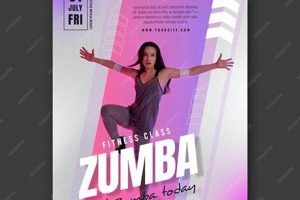The acquisition of Zumba routines or instructional content at no cost is a common pursuit among individuals interested in fitness and dance. This often involves seeking out trial versions of software, accessing promotional offers, or utilizing readily available resources on platforms that host user-generated content. For example, a beginner might search for introductory Zumba videos online to sample the workout style before committing to a paid subscription or class.
Gaining access to fitness content without financial commitment can lower the barrier to entry for many, making exercise more accessible and promoting a healthy lifestyle. Historically, physical fitness resources were often limited to those who could afford gym memberships or private instruction. The proliferation of digital resources, including free content, has democratized access to fitness information and programs. This increased availability enables individuals to explore diverse workout styles and find activities that suit their personal preferences and needs, promoting greater adherence to fitness routines.
The subsequent sections will explore the various avenues through which individuals can find introductory fitness content, examining legal and ethical considerations related to accessing copyrighted material, and offering guidance on how to discern the quality and safety of freely available workout programs.
Guidance on Acquiring Complimentary Fitness Resources
This section outlines key considerations for individuals seeking to obtain Zumba-related content without incurring costs. Prioritize safety and legality while exploring available options.
Tip 1: Utilize Official Trial Periods: Many authorized fitness platforms offer limited-time, no-cost trial periods. These provide access to a selection of Zumba classes or routines. Adhere to the terms and conditions of the trial to avoid unexpected charges.
Tip 2: Explore Reputable Video-Sharing Platforms: Platforms like YouTube host a substantial amount of fitness content. Search for certified Zumba instructors who offer introductory routines or shorter sessions for free. Verify the instructor’s credentials before following their guidance.
Tip 3: Participate in Community Events: Local community centers or fitness studios sometimes host promotional Zumba classes or open houses. These provide an opportunity to experience a live class without financial commitment.
Tip 4: Scrutinize Download Sources Carefully: Exercise extreme caution when downloading fitness videos or programs from unofficial websites. Verify the legitimacy of the source and scan downloaded files for malware before opening them.
Tip 5: Prioritize Safety and Proper Form: Regardless of the source, ensure that the fitness routine is appropriate for one’s current fitness level. Focus on proper form to prevent injuries. Consider consulting a healthcare professional before starting any new exercise program.
Tip 6: Respect Copyright Laws: Avoid downloading or distributing copyrighted material illegally. Supporting authorized content creators ensures the continued availability of quality fitness resources.
Engaging in physical activity should be both accessible and safe. By exercising diligence in resource selection and prioritizing personal well-being, individuals can leverage complimentary Zumba-related content effectively.
The concluding section will summarize the core principles discussed and offer avenues for continued engagement with fitness resources.
1. Legality
The concept of legality forms a foundational consideration when engaging in the pursuit of Zumba routines or instructional materials without direct monetary exchange. It directly impacts the availability and ethical consumption of fitness content.
- Copyright Infringement
Copyright law protects the intellectual property of Zumba Fitness, LLC, including choreography, music, and branding. Unauthorized distribution or replication of these materials, even if offered without charge, constitutes copyright infringement. For instance, downloading a complete Zumba class video from a torrent site is a clear violation. The implications include potential legal repercussions for both the distributor and the consumer.
- Fair Use Doctrine Limitations
The fair use doctrine allows limited use of copyrighted material for purposes such as criticism, commentary, news reporting, teaching, scholarship, or research. However, this exception is narrowly defined. Utilizing a substantial portion of a Zumba routine for commercial purposes, or even for private instruction without permission, typically falls outside the scope of fair use. The limitations are significant when considering repurposing or sharing Zumba content.
- Terms of Service Compliance
Official Zumba platforms and affiliated websites operate under specific terms of service agreements. These agreements outline permitted uses of content and prohibit unauthorized dissemination. For example, sharing login credentials or downloading content from a streaming service for offline use beyond the allowed parameters violates these terms. Adherence to the terms of service is essential for lawful access.
- Distinction Between Free Trials and Piracy
Legitimate access to Zumba content without cost is often facilitated through official free trials or promotional periods offered by Zumba Fitness, LLC or its partners. These offerings provide temporary access to copyrighted material under specific conditions. This contrasts sharply with piracy, which involves illegally obtaining and distributing copyrighted works. The distinction rests on authorized access versus unauthorized appropriation.
These facets of legality directly influence the methods by which individuals can responsibly and ethically access Zumba resources. Understanding these legal parameters is crucial for navigating the digital landscape of fitness content and ensuring compliance with copyright regulations.
2. Safety
The acquisition of Zumba instructional content at no cost necessitates careful consideration of safety protocols. The lack of oversight inherent in freely available resources presents potential risks that must be addressed to mitigate potential harm.
- Untrained Instructors and Improper Technique
Freely available Zumba videos may feature instructors lacking formal certification or adequate training. Following their instruction can lead to the adoption of improper techniques, increasing the risk of injuries such as sprains, strains, or more serious musculoskeletal problems. For example, a video demonstrating a modified Zumba routine without proper cueing on posture could result in lower back pain for viewers attempting the exercise. Verification of instructor credentials is paramount.
- Inadequate Warm-up and Cool-down Procedures
Many freely distributed fitness videos, including those purporting to be Zumba routines, may omit or abbreviate essential warm-up and cool-down segments. Insufficient preparation before engaging in intense physical activity elevates the likelihood of muscle tears and cardiovascular strain. Likewise, neglecting the cool-down phase can impede recovery and contribute to delayed onset muscle soreness. A comprehensive warm-up and cool-down are vital for injury prevention.
- Unsafe Exercise Environment and Lack of Supervision
Individuals engaging in Zumba routines via unsupervised online videos may not have access to a safe and appropriate exercise environment. Insufficient space, uneven flooring, or the presence of obstructions can significantly increase the risk of falls and other accidents. The absence of a qualified instructor to provide real-time feedback and correction further compounds this risk. A dedicated and safe exercise space is crucial.
- Medical Considerations and Individual Limitations
Freely accessible fitness content rarely includes comprehensive pre-screening for underlying health conditions or modifications for individual limitations. Individuals with pre-existing injuries, cardiovascular issues, or other medical concerns may unknowingly exacerbate their conditions by participating in unsuitable Zumba routines. Consulting a healthcare professional before starting any new exercise program is strongly recommended.
These facets of safety highlight the importance of exercising caution when utilizing Zumba content acquired without cost. Prioritizing qualified instruction, appropriate exercise environments, and individual medical considerations can substantially reduce the risk of injury and ensure a safer fitness experience.
3. Authenticity
The concept of authenticity carries significant weight when considering Zumba instructional material obtained without cost. The proliferation of online content necessitates careful evaluation to ensure the veracity and legitimacy of the source and the instruction provided, especially for those accessing Zumba for fitness purpose.
- Certification Verification
Genuine Zumba instructors hold valid licenses issued by Zumba Fitness, LLC. These licenses signify completion of required training and adherence to established teaching standards. Free content may be offered by individuals misrepresenting their qualifications, potentially leading to ineffective or even harmful instruction. Scrutinizing instructor credentials, such as license numbers, directly on the official Zumba website is essential for verifying authenticity. Unverified content risks misrepresentation of the Zumba program.
- Choreography Integrity
Authentic Zumba routines incorporate specific steps and rhythms licensed by Zumba Fitness, LLC. Free content may deviate significantly from these established choreographies, offering modified or entirely different movements under the Zumba name. This dilution of the original program can mislead individuals seeking a genuine Zumba experience and may not provide the intended fitness benefits. Comparing routines to official Zumba resources can reveal discrepancies in choreography.
- Music Licensing Compliance
Zumba Fitness, LLC secures licenses for the music used in its programs. Unauthorized instructors may use music without proper licensing, infringing on copyright laws. While this may not directly impact the safety or effectiveness of the workout, it reflects a lack of professionalism and ethical conduct. The use of readily available, royalty-free music, rather than recognized Zumba tracks, can be an indicator of inauthenticity. Legal issues are one outcome of authenticity compromise.
- Branding and Trademark Usage
The Zumba brand is a registered trademark. Authentic Zumba materials adhere to specific branding guidelines. Free content displaying inconsistent logos, fonts, or other visual elements may be indicative of unauthorized use. This can be a subtle but important clue in distinguishing genuine resources from imitations. Misuse of the Zumba brand signals a lack of authorization.
These facets underscore the need for discerning judgment when accessing Zumba instruction without financial investment. While free resources may offer a convenient introduction to the program, prioritizing authenticity safeguards against misrepresentation and ensures a legitimate and potentially safer fitness experience. The onus rests on the consumer to critically evaluate the source and content of supposedly “Zumba” material obtained at no cost.
4. File security
The acquisition of Zumba-related content through cost-free avenues often involves downloading files from various online sources. This process inherently introduces file security risks. The potential for malicious software, such as viruses or malware, to be embedded within these downloaded files poses a significant threat to the user’s device and data. For instance, a seemingly legitimate Zumba workout video downloaded from an untrusted website could contain a Trojan horse that compromises the system upon execution. The correlation is direct: the pursuit of Zumba content at no cost frequently relies on file downloads, thus increasing exposure to potential security breaches.
The importance of file security within the context of acquiring complimentary Zumba resources cannot be overstated. Unsecured files can lead to identity theft, financial fraud, and the compromise of sensitive personal information. Consider the scenario where an individual downloads a Zumba routine accompanied by a malicious keylogger. This keylogger could then capture keystrokes, including passwords and credit card details, as the user engages in online activities. Understanding this potential consequence underscores the necessity of implementing robust security measures, such as utilizing reputable antivirus software and exercising caution when selecting download sources. Moreover, verifying the file extension and source origin becomes critically important.
In summary, the quest for Zumba instructional content without financial investment necessitates a heightened awareness of file security. The potential for malicious software to be bundled with seemingly innocuous files creates a tangible risk. Employing preventative measures, such as utilizing antivirus software and verifying download sources, mitigates these risks. Prioritizing file security is paramount to ensuring a safe and secure experience when accessing Zumba resources through free avenues.
5. Instructor Credibility
The credibility of the instructor presenting Zumba routines offered without cost is of utmost importance. The absence of financial investment necessitates increased scrutiny regarding the qualifications and expertise of the individual leading the exercise program. Assessing the instructor’s background ensures safety and effectiveness.
- Certification and Licensing
Formal certification from Zumba Fitness, LLC indicates that an instructor has completed required training and adheres to established teaching standards. Freely available content may be presented by individuals without proper certification, potentially leading to incorrect or unsafe instruction. Verifying the instructor’s licensing status on the official Zumba website mitigates this risk. For instance, an individual leading a Zumba class in a public park advertised through social media should possess verifiable credentials. The consequences of following uncertified instructors range from ineffective workouts to physical injuries.
- Experience and Background
An instructor’s experience teaching Zumba, coupled with their broader background in fitness or dance, contributes to their credibility. More experienced instructors are better equipped to adapt routines to different fitness levels and provide effective modifications. Conversely, instructors with limited experience may struggle to cater to diverse needs. A seasoned instructor might possess expertise in kinesiology or physical therapy, enhancing their ability to address specific physical limitations. Considering the instructor’s relevant experience bolsters confidence in their abilities.
- Reputation and Reviews
The reputation of the instructor within the fitness community provides valuable insight into their credibility. Positive reviews from past participants or recognition from reputable fitness organizations are indicators of competence and professionalism. Conversely, negative reviews or a lack of recognition should raise concerns. For example, an instructor with numerous complaints regarding unsafe practices or ineffective teaching methods warrants avoidance. Seeking feedback from reliable sources assists in assessing instructor credibility.
- Insurance Coverage
Legitimate Zumba instructors typically maintain liability insurance to protect themselves and their participants in the event of an injury during a class. The absence of insurance coverage may suggest a lack of professionalism or a disregard for safety. While this information may not always be readily available, inquiring about insurance coverage provides an additional measure of assurance. Instructors unwilling to disclose their insurance status raise red flags. Confirming insurance coverage adds a layer of security.
These facets of instructor credibility directly influence the safety and effectiveness of Zumba routines accessed without cost. Prioritizing certified, experienced, and reputable instructors minimizes the risks associated with freely available fitness content. Diligence in verifying instructor credentials contributes to a more positive and secure fitness experience when pursuing no-cost Zumba options.
6. Content Quality
The acquisition of Zumba routines or instructional content through sources offering “zumba free download” necessitates careful consideration of content quality. The inherent lack of financial investment often correlates with reduced quality control, impacting the safety, effectiveness, and overall benefit derived from the fitness program. Consequently, the pursuit of complimentary Zumba resources mandates a discerning approach to evaluating the substance of the offered materials. For example, a free Zumba video might exhibit poor audio and visual clarity, making it difficult to follow the instructor’s movements. This compromises the ability to replicate the exercises correctly, thus diminishing the intended fitness benefits. Furthermore, low-quality content may contain inaccurate information or even promote unsafe practices.
The assessment of content quality should encompass several factors, including the instructor’s credentials, the clarity of instruction, the accuracy of the choreography, and the overall production value of the material. A free Zumba class led by an uncertified individual could deviate significantly from the established Zumba curriculum, potentially resulting in ineffective or even harmful exercise. Conversely, a well-produced video featuring a certified instructor, clear explanations, and properly licensed music can offer a valuable fitness experience, even if accessed without charge. The importance of these factors is underscored by the potential for injury resulting from improperly demonstrated techniques or a lack of appropriate modifications for different fitness levels. Therefore, individuals must actively evaluate the substance of the material being accessed, irrespective of its cost.
In conclusion, while the prospect of “zumba free download” is attractive, the connection to content quality presents a significant challenge. The absence of financial investment often translates to diminished quality control, potentially compromising the safety and effectiveness of the Zumba program. By prioritizing the evaluation of instructor credentials, instructional clarity, choreographic accuracy, and production value, individuals can mitigate the risks associated with freely available content and maximize the benefits derived from their fitness endeavors. The pursuit of complimentary resources should not supersede the commitment to obtaining high-quality instruction and ensuring a safe and effective workout experience.
7. Copyright respect
The principle of copyright respect is intrinsically linked to the phenomenon of “zumba free download.” The availability of Zumba-related content at no monetary cost often raises concerns regarding the unauthorized distribution and consumption of copyrighted material. Adherence to copyright laws is essential for ethical access and utilization of such resources.
- Unauthorized Distribution
The dissemination of Zumba routines, music, or instructional videos without the explicit permission of Zumba Fitness, LLC, constitutes copyright infringement. This illegal distribution often occurs through file-sharing websites, torrent platforms, or social media channels. Such actions undermine the intellectual property rights of the copyright holder and can result in legal repercussions for both the distributor and the downloader. The unauthorized upload of a Zumba class recording to a public video-sharing site is a common example of this violation. The widespread availability of “zumba free download” frequently stems from these unauthorized sources.
- Personal Use Limitations
While accessing legally acquired Zumba content for personal fitness purposes is generally permissible, the scope of “personal use” is limited. Sharing purchased or legally obtained Zumba materials with others, even without direct financial gain, can still infringe upon copyright. For example, distributing a downloaded Zumba workout video to friends or posting it on a private online forum violates the terms of the license granted for personal use. The interpretation of “personal use” does not extend to the redistribution of copyrighted works.
- Fair Use Inapplicability
The fair use doctrine, which allows limited use of copyrighted material for purposes such as criticism, commentary, or education, typically does not apply to the wholesale reproduction and distribution of Zumba content. Employing segments of Zumba routines for educational purposes in a non-profit academic setting may fall under fair use, but downloading and sharing entire Zumba class videos does not. The commercial nature of most Zumba routines and the extent of their reproduction negate the applicability of fair use in the context of “zumba free download.”
- Monetary Ramifications
The illegal distribution and consumption of copyrighted Zumba material can have significant economic consequences for Zumba Fitness, LLC, and its licensed instructors. Revenue generated through authorized subscriptions, classes, and merchandise is crucial for supporting the continued development and distribution of high-quality Zumba content. Widespread access to “zumba free download” diminishes the market for legitimate Zumba products and services, potentially hindering the ability of the company to invest in new routines and training programs. The financial sustainability of the Zumba ecosystem is directly affected by adherence to copyright laws.
The prevalence of “zumba free download” underscores the ongoing challenge of balancing accessibility with copyright protection. While the desire to access fitness resources without cost is understandable, respecting copyright laws is essential for supporting content creators and ensuring the continued availability of legitimate Zumba programs.
Frequently Asked Questions
This section addresses common inquiries and concerns regarding the acquisition of Zumba fitness content without monetary expenditure. The information presented aims to provide clarity and guidance within a legal and ethical framework.
Question 1: Is accessing Zumba routines through “zumba free download” always legal?
Accessing Zumba routines via “zumba free download” is not inherently legal. The legality hinges upon the source and method of acquisition. Downloading copyrighted material from unauthorized websites or peer-to-peer networks constitutes copyright infringement. Conversely, utilizing official free trials or accessing content explicitly offered for free by Zumba Fitness, LLC, or its authorized partners is permissible.
Question 2: What are the potential risks associated with “zumba free download”?
Engaging in “zumba free download” carries potential risks, including exposure to malware and viruses embedded within downloaded files. Additionally, the instructional content may be of substandard quality, leading to improper form and potential injuries. Copyright infringement is also a significant concern, potentially resulting in legal ramifications.
Question 3: How can one ensure the safety of Zumba routines accessed through “zumba free download”?
Ensuring safety requires careful evaluation of the source and content. Verify the instructor’s credentials and experience. Scrutinize the choreography for accuracy and adherence to established Zumba techniques. Ensure that the routine includes adequate warm-up and cool-down periods. If downloaded, scan files with reputable antivirus software before execution.
Question 4: What are legitimate alternatives to “zumba free download”?
Legitimate alternatives include utilizing official free trial periods offered by Zumba Fitness, LLC, or its streaming partners. Explore free introductory routines available on platforms like YouTube, focusing on certified instructors. Consider participating in promotional Zumba classes or open houses hosted by local fitness studios or community centers.
Question 5: How does one verify the authenticity of a Zumba instructor when accessing “zumba free download” content?
Authenticity can be verified by checking the instructor’s certification status on the official Zumba Fitness, LLC, website. Look for license numbers or certifications displayed on the instructor’s profile or website. Be wary of instructors lacking verifiable credentials or displaying inconsistent branding associated with the Zumba program.
Question 6: What are the ethical considerations surrounding “zumba free download”?
Ethical considerations center on respecting intellectual property rights. Downloading copyrighted material without authorization deprives content creators of rightful compensation and undermines the sustainability of the Zumba ecosystem. Supporting authorized Zumba instructors and purchasing legitimate products contributes to the continued availability of high-quality fitness resources.
In summary, while accessing Zumba content without cost may be appealing, careful consideration of legality, safety, authenticity, and ethical implications is crucial. Prioritizing legitimate sources and verifying instructor credentials mitigates potential risks and supports the Zumba community.
The subsequent section will explore practical tips for finding affordable Zumba classes and resources while adhering to ethical and legal guidelines.
Conclusion
The exploration of “zumba free download” reveals a multifaceted landscape marked by both opportunity and risk. The pursuit of cost-free access to Zumba routines and instructional materials necessitates a discerning approach. The importance of legality, safety, authenticity, file security, instructor credibility, content quality, and copyright respect cannot be overstated. The analysis has underscored the potential for copyright infringement, malware exposure, physical injury from improper instruction, and the ethical implications of accessing content without compensating creators.
The responsible navigation of the “zumba free download” terrain requires a commitment to informed decision-making. Individuals must prioritize the verification of sources, instructors, and content quality to mitigate risks and ensure a positive experience. Ultimately, a balanced approachone that respects intellectual property while seeking affordable fitness optionspromotes a sustainable and ethical Zumba community. Further research and critical evaluation remain essential for making informed choices regarding free access to Zumba content and fitness resources.




![Find FREE Zumba Classes Near Me for Ladies - [Location]! The Ultimate Zumba Guide: Dance Your Way to a Healthier You Find FREE Zumba Classes Near Me for Ladies - [Location]! | The Ultimate Zumba Guide: Dance Your Way to a Healthier You](https://mamazumba.com/wp-content/uploads/2025/10/th-896-300x200.jpg)


